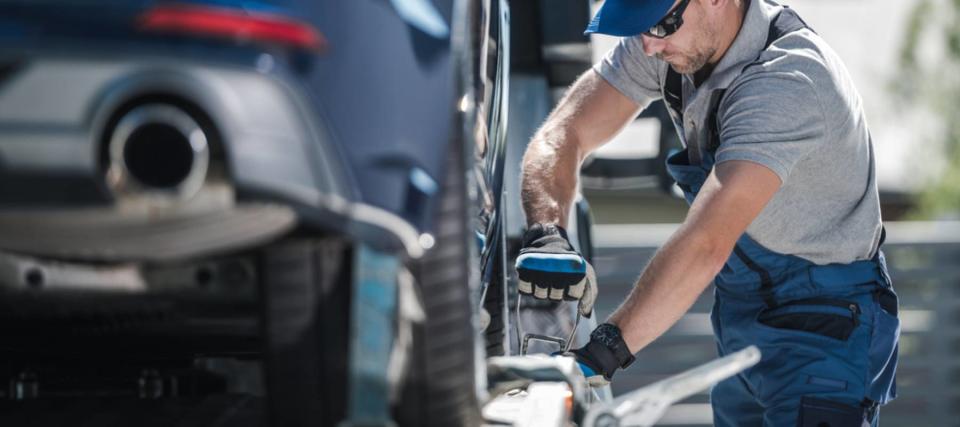Ford just applied for a patent on cars that can automatically repossess themselves. Here are 3 tips to save on your auto expenses now — so your car won't drive away in the future

Remember those TV shows about repo agents trying to recover vehicles due to non-payment of loans — but were confronted by vehicle owners who were unwilling to surrender their cars?
Well, with a system described in Ford’s newly revealed patent application, the job for repo agents could get much easier.
Don't miss
A record number of Americans are grappling with $1,000 car payments and many drivers can't keep pace. Here are 4 ways to stay ahead
UBS says 61% of millionaire collectors allocate up to 30% of their overall portfolio to this exclusive asset class
'Hold onto your money': Jeff Bezos issued a financial warning, says you might want to rethink buying a 'new automobile, refrigerator, or whatever' — here are 3 better recession-proof buys
If a vehicle owner keeps ignoring warnings about missed payments, the system can “disable a functionality of a component of a vehicle or may place the vehicle in a lockout condition.”
Moreover, the system can turn on an “incessant and unpleasant sound” whenever “the owner is present in the vehicle.”
What if the owner still won’t pay? The system can help with that, too.
In some cases, the vehicle could move autonomously to the premises of a repossession agency, lending institution, an impound lot, or any other pre-designated location.
The patent, titled Systems and Methods to Repossess a vehicle, was filed in August 2021 and published last month.
At a time when cars are getting more expensive and interest rates are on the rise, auto payments can be a burden to many.
To prevent your vehicle from getting self-repossessed in the future, here are some tips on how to save money on your car.
No need to show off
We all have our dream cars. But the reality is, most cars are depreciating assets. And expensive cars also typically cost more to maintain and insure.
So the first tip is simple: don’t buy a car you can’t afford.
In fact, even millionaires don’t always have fancy cars on their driveways.
Personal finance expert Dave Ramsey points out that for those who have built their first level of wealth — he defines it as having a net worth of between $1 million and $10 million — the cars they drive are “understated” and that “the valet is seldom impressed.”
“It’s usually a used Camry or a nice used Honda or a nice old pickup truck of some kind,” he said during an episode of The Ramsey Show.
“People that achieve that layer of wealth, that one to ten million dollars, the way they did it is, they didn’t do it for you. They’re not mad at you, but they don’t care what you think. They were not living their life to impress others.”
Simply put, don’t try to keep up with the Joneses.
Read more: You could be the landlord of Walmart, Whole Foods and CVS (and collect fat grocery store-anchored income on a quarterly basis)
Don’t drive aggressively
With elevated gas prices over the past year, we’ve all felt the pain at the pump. So it’s important to remind ourselves that the way we drive can affect the mileage we get.
According to the Department of Energy, aggressive driving — defined as speeding, rapid acceleration, and braking — can lower gas mileage by 15% to 30% at highway speeds. For stop-and-go traffic, it can lower gas mileage by 10% to 40%.
And this applies not just to cars powered by internal combustion engines. Having a heavy right foot can impact the mileage of electric vehicles as well.
The Department of Energy says that when it comes to battery electric vehicles, “rapid acceleration reduces vehicle range” compared with “gradual acceleration.”
It’s no surprise: regardless of what type of fuel your vehicle is running on, it takes energy to accelerate it.
Therefore, if you want to get more miles out of one tank — or one charge — be gentle with the accelerator pedal.
Compare auto insurance
Other than paying for the car, the gas (or electricity), and the maintenance and repairs, car owners also need to have valid insurance to be on the road.
And these days, premiums aren’t cheap.
Obviously, your premiums will depend on many factors, such as the make and model of your vehicle, your age, driving history, use, and where you live. But it can be hefty: A recent report by Insurify found that Americans could pay 16% more for car insurance — that's almost $1900 — in 2023.
No matter what type of vehicle you drive, if you think you are paying too much for your car insurance policy, you might want to compare car insurance and save up to $500 a year.
What to read next
Americans are paying nearly 40% more on home insurance compared to 12 years ago — here's how to spend less on peace of mind
The US dollar has lost 98% of its purchasing power since 1971 — invest in this stable asset before you lose your retirement fund
Earn extra cash for your weekend with these quick money hacks
This article provides information only and should not be construed as advice. It is provided without warranty of any kind.

 Yahoo Finance
Yahoo Finance 